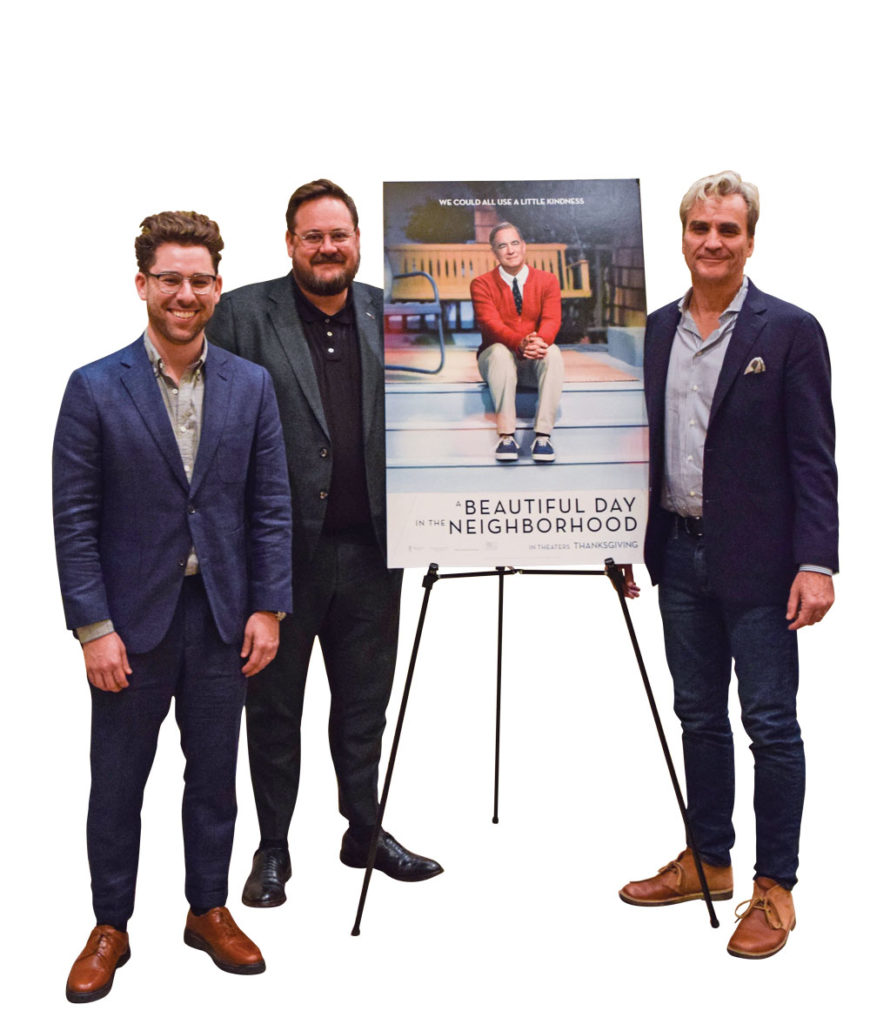Can You Say… Heroes?

Story and Photo by Kaitlin Hill
The camera pans out, bringing the little paper town into full view, and an instantly recognizable tune is playing. Next, a red cardigan, blue canvas sneakers, and the soothing voice of everyone’s childhood hero sings, “It’s a beautiful day in the neighborhood, a beautiful day for a neighbor. Would you be mine?”
The opening scene of A Beautiful Day in the Neighborhood, screened at this year’s Middleburg Film Festival, extends that familiar invitation to viewers and the opportunity to return to Mister Rogers’ Neighborhood where they’ll meet new neighbor, Lloyd Vogel (Emmy Award® Winner Matthew Rhys), a complex and troubled journalist, and longtime friend of Mister Rogers (Academy Award® Winner Tom Hanks).
The tough-at-times but ultimately heartwarming on-screen friendship between Vogel and Rogers is based on the real-life relationship of Fred Rogers and Tom Junod, who profiled the TV star for a 1998 Esquire issue on heroes.
Junod’s article, “Can You Say…Hero?” and the new movie, scheduled for release this Thanksgiving, paint the picture of an unlikely hero. Quiet, kind, and disarmingly vulnerable, Mister Rogers is proof that superheroes don’t need to be draped in capes, hell-bent on avenging, or even superhuman. Rather, Rogers’ ability to find value in all people, form meaningful connections, and operate, as Junod puts it, with “unashamed insistence on intimacy” are the measures of true heroism.
“That was his superpower. It really was. He had that ability to find people, in that he had the ability to find out what they needed in the moment,” says Junod. Screenwriter for the movie Noah Harpster adds, “I think he had a lot of superpowers. Finding someone is definitely one. Disarmament. But also, his ability to put something out there and wait, wait, wait until something is given back.”
By this definition, Harpster and his screenwriting partner, Micah Fitzerman-Blue can certainly be considered heroes themselves – for finding and telling Junod’s story, working on the film for ten years and, of course, waiting, waiting, waiting for the payoff of presenting it to a public that so desperately needs it.

With a slight sigh, Fitzerman-Blue recalls, “It is so hard to be a screenwriter. To have spent the last ten years working on this project, as frustrating as it has been, to finally see this thing in theaters, and the privilege that we had for this to be our subject, this was the reason we kept going.”
“It was hard, and that has to do with not only getting Mister Rogers right but getting Mister Rogers’ rights. We spent years working to convince the estate to talk to us and then to work with us to find the right way into the story. We worked with Tom to take so much from his life and his experience [with Mister Rogers] in his words,” he adds.
“And then, when you get into the actual filmmaking, we shot the movie in Pittsburgh at WQED,” Fitzerman-Blue says. “We used some of the same cameras from when the show was actually shot. We recreated all of the sets, all of the miniatures.” Even more impressive is Fitzerman-Blue and Harpster’s ability to convey the essence of Fred Rogers, a man, like all men, who was much more than his neighborly character.
“The thing that the movie captures so well is that he wasn’t just a nice man. He’s a nice man, but he wasn’t just a nice man. He was a determined man. He was a resolute man. He was kind of a relentless man. He was a relentless friend,” Junod reflects.
Fitzerman-Blue comments, “What we wanted to show isn’t that Mister Rogers was infallible or a saint, but he was someone who had darkness. He had problems in his life. Life isn’t perfect. It’s a struggle for everybody, including him.” The screenwriters’ efforts, attention to detail, and Hanks’ masterful acting result in a movie that is undeniably true to Mister Rogers’ form.
Fitzerman-Blue praises Hanks’ performance, saying, “It’s not an impersonation. That is not something he was after or something we wanted…We wanted to make sure that all of this was a container to give a broad audience the experience of connecting with this person.”
Junod’s on-screen identity, Lloyd Vogel, is also a major player in connecting the audience to Mister Rogers and the film. He notes, “I think that my character is not just me. I mean, he’s sort of a stand-in for all of the people that Fred Rogers had a relationship with. And he had a relationship with a lot of people.”
According to Junod, “When he met people, I always had the feeling, certainly when he met me, that he kind of knew what he wanted to accomplish.” As the film progresses, Vogel softens from a cynical and unnatural family man to a better dad, son, husband, and friend. For Rogers, it was never an obligation or a task. It was a way of life.
Mister Rogers once confessed to Junod, “The connections we make in the course of a life—maybe that’s what heaven is, Tom. We make so many connections here on earth. Look at us—I’ve just met you, but I’m investing in who you are and who you will be, and I can’t help it.”
Tom Hanks as Mister Rogers is a welcomed dose of nostalgia and link to a time when, as Rodgers would put it, “You were a child once, too.” By contrast, the character development of Matthew Rhys as Vogel proves that Mister Rogers was just as focused on the personal growth of adults.
More than a re-creation or reenactment, and far from a caricature of a beloved childhood hero, A Beautiful Day in the Neighborhood serves as a reminder of who Mister Rogers was, what he stood for and why we still need him today. “It took us 10 years to make this movie, but it might be coming out at just the right moment,” Fitzerman-Blue admits.
Harpster remarks, “We talk about Lloyd being a placeholder for our audience, I think it is also true that he is a placeholder for our country, mankind, and their cynicism. I also think it’s funny that the article is called “Can You Say…Hero?” because we are in a society that doesn’t have heroes right now. Whether it’s politicians, professors, athletes, musicians or actors, they’ve all crumbled, and there is no one to truly believe in anymore.”
He continues, “We hope that Fred can fill that void. And I think that is what people are hungry for.”
Are there heroes? Can you say heroes? The reception the film received at the Middleburg Film Festival this October proved that even 16 years after his death, Fred Rogers is still a hero. Even more, mid-screening tears, moments of captivated silence, and uproars of laughter, not to mention the standing ovation during the closing credits, indicate that Junod, Fitzerman-Blue, and Harpster are heroes too. ML
This article first appeared in the November 2019 issue of Middleburg Life.


